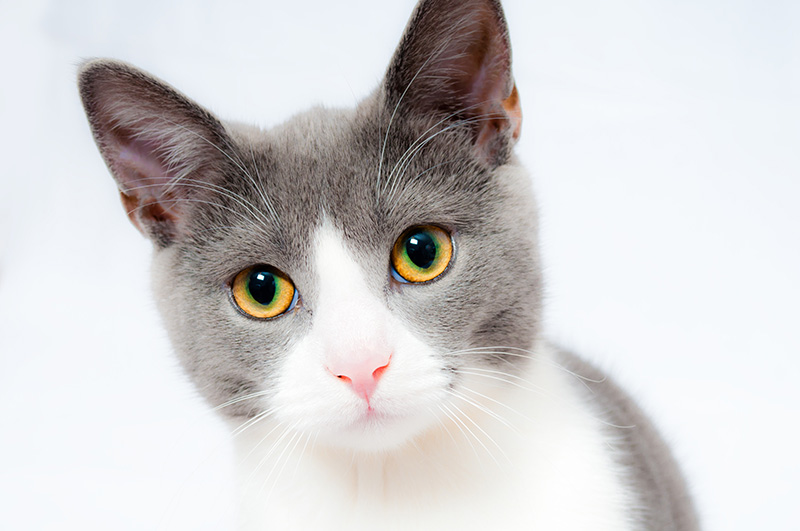Cats mark their territory with urine but the smell of cat urine can be unpleasant, to say the least. Just imagine if your cat urinates – and frequently, too, as if you don’t have enough issues related to pet ownership – in inappropriate places, usually outside of their litter box. Your cat may even have a preference for a particular object to urinate on, perhaps on your shoes.
Medical Causes
If you suspect an underlying medical issue, you should make an appointment for your cat with his vet. Your cat will then undergo a thorough physical assessment and, in most cases, laboratory exams to determine if, indeed, there’s a medical cause for his inappropriate urination. The cat experts at Petco cannot overemphasize the importance of ruling out medical causes before addressing behavioral causes – in many cases, addressing the medical issue makes it easier and faster to resolve the behavioral ones.
Infections and illnesses of the urinary tract in cats can cause inappropriate urination. There’s a wide range of possible diseases from bacterial infections to bladder stones that cause an increased urgency for elimination, pain in the abdomen, and even uncharacteristic aggression.
Diseases of the liver and kidney, which are organs involved in excretory functions, can also make cats drink more water resulting in the need for frequent urination. This, in turn, results in your cat being unable to reach his litter box in time or his litter box becomes soiled quicker than normal so he urinates somewhere else until it’s been changed.
The decline in brain function due to advancing age, hormonal disorders like diabetes, and decrease in sensory and mobility functions can also affect urinating habits. There are also medical issues that affect muscles, nerves and/or joints that can result in muscle stiffness, weakness, or discomfort that affect your cat’s ability to get into his litter box in time.
Important Tip: Get your cat to the vet emergency clinic if he’s having trouble urinating, such as when he cannot normally urinate or he completely cannot urinate, since he may have a urinary blockage. Blocked urination is a medical emergency and can be fatal when left untreated.
Behavioral Issues
Cats can be enigmatic creatures but you can observe them and understand their behavior. You may want to keep a log of your pet’s urinating habits and take note of the when, where and why. You will likely observe that your cat’s behavior is related to stress, anxiety or frustration, and it may be connected to changes in his routine, environment, or companions.
For example, his behavior may have been caused by his stress after relocation to a new house. He may be marking his territory to warn other cats to stay off it and to surround himself with his own familiar smells. He’s marking his territory when he backs up to a vertical surface (e.g., a wall), raises his tail, and directs a small stream of urine; he may also mark his territory on horizontal surfaces.
If you’re moving to a new house where a cat previously lived, you should clean the house as thoroughly as possible to remove any scent from the previous feline resident.
Yet another cause for inappropriate urination in cats is the litter tray. Your cat may not like the litter material, the type of liter tray, and/or where it’s located. You may have to experiment with these aspects until such time that you get the right combination of type, material and location.
Here are a few suggestions that can work:
- Place several litter trays in various locations in and out of your house. Choose quiet areas, usually away from household noise and traffic, so your cat can urinate in private. Observe where your cat seems to prefer urinating and place a litter tray in these places.
- Try different brands of cat litter and observe which one your cat prefers. Your elderly cat, for example, may be having a difficult time getting in and out of his litter tray due to his arthritis. You can then switch from a litter tray with high sides to one with either lower sides or an open tray.
- Clean the litter tray regularly or keep it spic-and-span cleans. Your cat may refuse to urinate in a dirty tray so change it as often as necessary, either every day or a few times a day. Be sure to rinse the litter box well so that there are not traces of another cat’s odor or of the odor from the cleaning solutions used.
- Place a litter box in areas where your cat seems to prefer urinating. Place it there for a week or so and the start moving it, a few inches daily, to a new, more appropriate location. Do it carefully so that your cat actually follows, so to speak, the tray and continues using it even as it’s moved.
Check if the areas where your cat should be urinating has a noticeable odor about them. Your cat may not like the smell here so you may have to use an odor neutralizer to remove it.
Conclusion
Instead of scolding your kitty, you should consider the possible causes behind his inappropriate urination. When you have determined the cause, you can take the corresponding measures to address it – with the professional guidance of your vet, of course, in medically-related cases.


